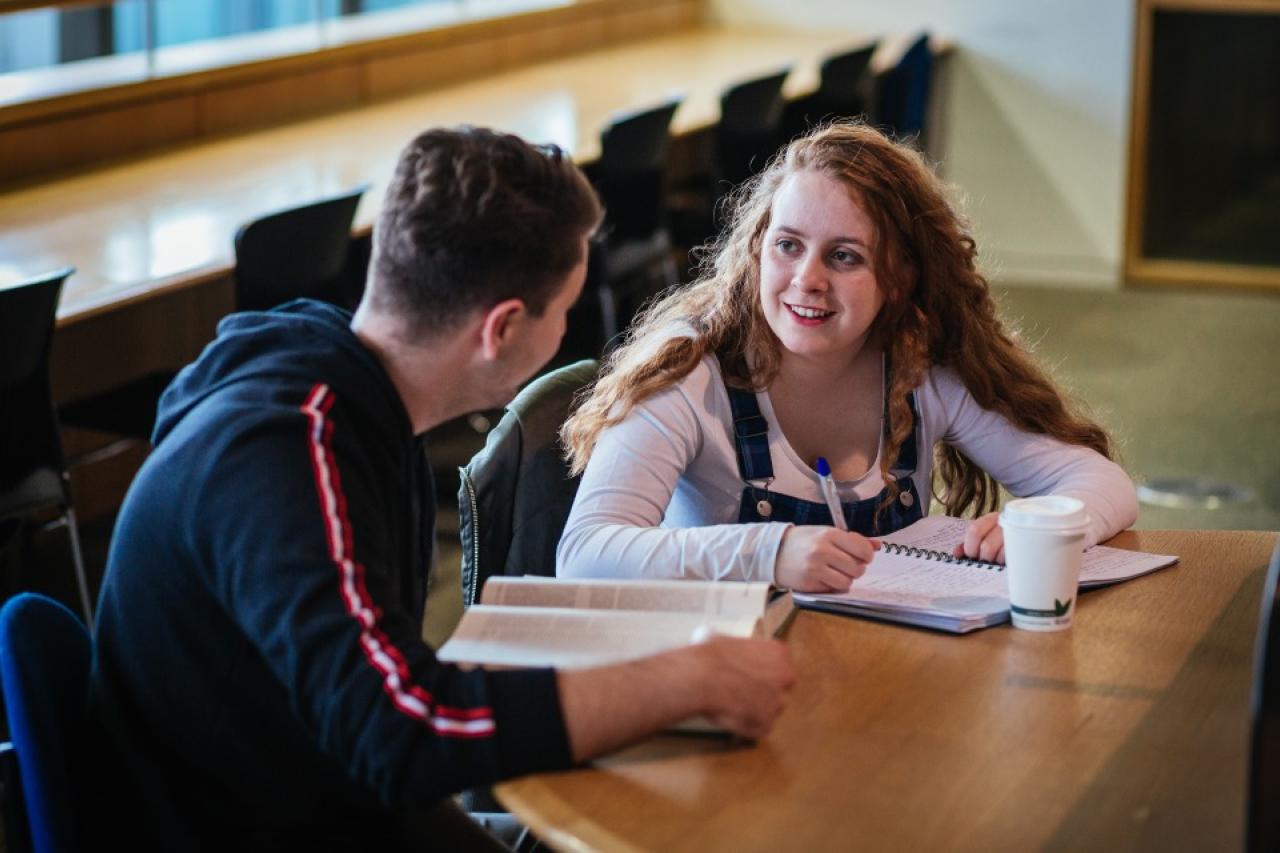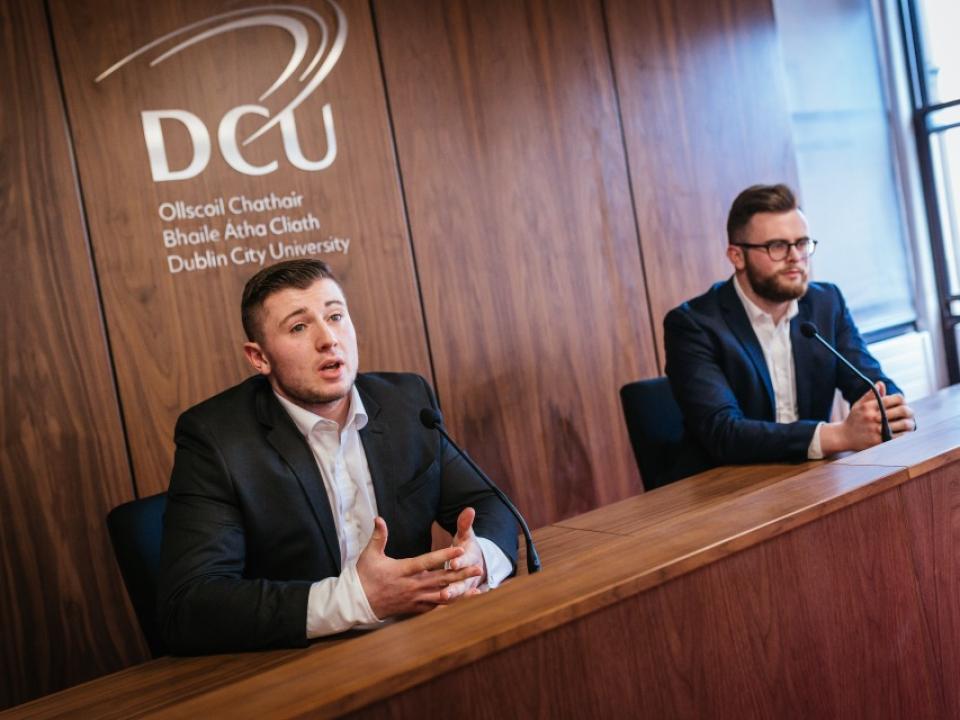Overview
Are you interested in how societies work? DCU’s Economics, Politics and Law (EPL) degree course is designed to give you a deep and thorough understanding of the political, legal and economic forces that shape the world.
Build strong foundations
This degree provides a solid base to all three disciplines and you will study foundational topics such as introductions to micro and macroeconomics, political science and constitutional law. You don’t need to have done any of these before. As you progress through your studies you may choose to specialise in areas such as Urban and Regional Economics, Issues in American Politics or Family Law, to name a few. You will also maximise your learning potential with dedicated research methods modules that will equip you with a variety of study skills.
Skills attractive to employers
This extremely versatile degree provides you with skills and knowledge that are highly valued across sectors including finance and banking, government and policy, the legal profession, NGOs and more. This degree will help you develop your oral and written communication skills, research techniques, critical thinking, teamwork and research abilities.
3 or 4 year degree
You can complete the BA in Economics, Politics and Law degree in three years, or choose to take an extra year either to study abroad or complete an INTRA placement.
Why DCU
DCU People

Growing up, I've always had a strong love and passion for Politics and trying to understand how the world functions.
Read more about Orliath Onoh
Hi I’m Eoin O'Malley and I’m an Associate Professor in politics at the School of Law and Government at Dublin City University.
Read more about Eoin O’Malley
Careers & Further Options
Careers
Graduates from the BA in Economics, Politics and Law degree take away a keen understanding of public policy and how government decisions are made with the ability to identify emerging issues and analyse policy proposals.
A degree that opens doors
The BA in Economics, Politics and Law gives you a strong grounding in all three disciplines that will stand you in good stead for a broad range of careers in law, consultancy, finance and various aspects of public policy making, including elected politics, social and political research, journalism, public affairs and advocacy. You will also have the chance to specialise in one of these disciplines as you progress in your degree, if desired. Organisations across the public, private and not for profit sectors depend on a keen knowledge of political, economic and legal environments, and this unique programme is geared to giving students the core skills that maximise their employability.
Solicitor’s exams
Graduates from this degree will also be prepared for entry to the Law Society of Ireland as trainee solicitors on successful completion of the relevant entrance exams, as the course covers all subjects required for these entrance exams. It is NOT a recognised law degree for entry to King’s Inns.
- Politics
- Public Service
- Broadcasting/Journalism
- Legal Service
- Advocacy/Campaigning
- Tax/financial services
- Policy-evaluation
- Research Academia
- Teaching
- Not for profit sector
- International and European Institutions
DCU graduates are highly sought after by employers. Our Graduates work in environments ranging from large multinationals to SMEs, family businesses and start-ups across every sector.
DCU Careers Service has a number of learning and development initiatives in place for our students, giving them the skills they need for a successful career path.
Entry Requirements
In addition to the general entry requirements for admission to the university the following entry requirements apply:
O4 or H6 in Mathematics
In addition to the general entry requirements for admission to the university the following entry requirements apply:
GCE A Level D or GCE AS Level C or GCSE C Mathematics
Please visit our Admissions webpage for details on course requirements or how to apply to DCU.
Please visit our QQI FET webpage for details on DCU courses, open days, campus tours or school visits.
To apply to DCU, please visit www.cao.ie.
Mature entry is a competitive process. Applicants must demonstrate:
- a genuine interest in the programme(s) they are applying for
- academic experience and competency in their chosen field of study
- an ability to engage and succeed on the programme
All applicants must complete a statement of interest to be considered for the mature application route.
For further guidance on the mature application process please see the CAO Website
Applicants that have completed at least one year of study at NFQ Level 6, 7 or 8 at another institution may apply to continue their studies on a similar programme at DCU. There should be substantial overlap in content between the two programmes to be considered for a transfer. Results and other supporting documentation must be submitted to CAO by the closing date of 1st July. This is a competitive application process for a small quota of advanced entry places. Offers are made on a rolling basis until all places are filled. Early application is advised. Please note: Applicants should also consider applying through the appropriate route for first year entry to the programme they are interested in. This application process is only for advanced entry.
International candidates are expected to have educational qualifications of a standard equivalent to those outlined above. In addition, where such candidates are non-native speakers of the English language they must satisfy the university of their competency in the English language. For further information on international applications click here.
Course Structure
In Years 1 and 2, there is an equal weighting of the three disciplines of economics, politics and law. In the final year, you take a core module in each discipline. Beyond that, you are free to specialise in one of the three disciplines or continue to study a combination of all three. Research methods modules taken in Years 1 and 2 will provide core learning skills that you will use throughout your degree. In final year, further modules will enhance your knowledge of research methods and dissertation skills. These skills will provide you with the tools to analyse major issues affecting society from an economic, political and legal perspective.
Dissertation
In your final year, you may choose to complete a written dissertation - this is your final project that showcases all you’ve learned and the skills you have acquired over the course of your studies.
Final year
The BA in Economics, Politics and Law is normally a three-year course. However, you can elect to spend an extra year either at a university abroad or to work in an INTRA placement in Year 3 which will mean you complete your final year at DCU in year 4.
Study abroad
Studying abroad provides a wonderful opportunity to experience the culture of another country and greatly enhances your language skills. You will have an option to study abroad for a year at one of our partner universities in Year 3 and complete the final year of your degree in Year 4 in DCU. (The option to study abroad is offered on merit once you fulfil the criteria.)
INTRA placement
You will have an option to apply for a year-long paid work placement as part of DCU’s INTRA placement programme in Year 3 and complete the final year of your degree in Year 4. INTRA provides you with a chance to work in a real world environment giving you a unique opportunity to enhance your CV, increase your employability and experience the relevance of your study. For more information on the INTRA programme at DCU, please visit www.dcu.ie/intra (Note: This option is competitive and subject to the availability of placements.)
Learn from the best
Lecturers on this course are engaged experts in politics, policy, economics, law and society who you will often find giving commentary on key societal issues in the media. Their style of teaching on this degree puts an emphasis on doing, with classes focused on practical problem-solving.
What Will I Study?
While content of the course may change over time, these modules are indicative of what you will be studying in each year.
- Constitutional Law
- Introduction to Politics
- Mathematics for Economics
- Introduction to Microeconomics
- Data Analysis
- Introduction to European Integration
- International Political Economy
- Introduction to Macroeconomics
- Intermediate Microeconomics
- The Irish Political System
- The Law of Contract
- European Union Law
- Criminal Law 1
- Intermediate Macroeconomics
- Public Finance
- Research Design and Methods
- Political Ideologies
- Advanced European Union Law
- Optional study year abroad or INTRA placement
You may choose to specialise in the final year or continue to study a mix of disciplines from the options available.
Core Modules
- Topics in Applied Economics
- Jurisprudence
- Public Policy
Options Include
- Dissertation
- Uaneen Award: DCU’s Leadership and Engagement Module
Economics Specialism:
- Economics Estimation and Analysis
- Financial Markets
- Development Economics
- Industrial Economics
- Public Choice
- Urban and Regional Economics
- Financial Theory
- International Trade and Business
- Mathematics of Finance
Politics Specialism:
- Post-Soviet Politics
- The Politics of Sub-Saharan Africa
- The Politics of South Asia
- Money and Politics
- Nationalism & Populism
- Issues in American Politics
- Issues in European Integration
- Contemporary Politics of the Middle East and North Africa
- The Politics of Migration in Europe
Law Specialism:
- Property Law 1 and 2
- Law of Torts 1 and 2
- Issues in European Law
- Company Law
- Employment Law
- Administrative Law
- Family Law
- Advanced Company Law
- Law of Evidence
- Jurisprudence 2
- Principles of Equity and Trust
- International Trade Law
- Climate Change Law
Fees and Funding
Fees
How To Apply
Applicants presenting EU School Leaving/FETAC Level 5 examinations: Apply through the Central Applications Office (CAO) by 1st February or 1st May
To apply for this programme:
Candidates should apply directly here. Here's a quick step by step guide if you need help with your application.
Please provide
- Academic Transcripts for each and every year of study with English translation, if applicable.
- If applicable, provide evidence of competence in the English language as per DCU entry requirements.
Applications are accepted on an ongoing basis up to 1st July. All Non-EU candidates are advised to apply early, as places are limited.
All mature applicants apply through the CAO by 1st February. For further information and for special application procedures for mature students, please click here
Applications are made via the CAO Advanced Entry route which will open on the 5th of November to 1st July.
Please see Application Procedures or E-mail ugadmissions@dcu.ie.
Candidates submitting EU examination results are required to apply through the CAO at www.cao.ie
Candidates submitting non-EU examination results are required to apply directly here
Life On Campus
As an EPL student you might be interested in joining the DCU Debate Society which aims to encourage the personal development of its members, whether that be in relation to self confidence or simply fine tuning our arguments.
Dublin Law and Politics Review
Another society relevant to you is the Dublin Law and Politics Review which promotes interdisciplinary thinking in law and politics and facilitates learning. It also publishes the Dublin Law and Politics Review, a peer-reviewed academic magazine.
Enactus
Members develop the skills necessary to become the leaders of tomorrow - be it working for a corporate organisation, volunteering for a charity or setting up their social enterprise. DCU’s Enactus also takes part in the Enactus National Competition in June and has won this competition 6 out of 10 times and represented Enactus Ireland at the Enactus World Cup.
More societies
Other DCU societies that you may want to check out include the Politics Society, Law Society, Student Business Consulting Society, Social Democrats, Young Fine Gael Society, Young Greens Society, People Before Profit, Ógra Shinn Féin, Ógra Fianna Fáil,
At DCU, our students can expect a unique campus experience. We are known for our excellent teaching and learning facilities, our active clubs and societies, and our great social and sporting facilities. All this makes DCU an exciting place to be.
DCU has three academic campuses; Glasnevin, St. Patrick’s and All Hallows (both in Drumcondra), all close to Dublin City centre.
They can be reached by public transport, Dublin Bus and Bus Éireann, with our Drumcondra campuses a ten minute walk from Drumcondra Train Station. Glasnevin is a 20 minute walk from St Patrick’s and All Hallows. They are also linked by Dublin Bus.
Each campus has a library (O’Reilly, Cregan and Woodlock Hall), study spaces, restaurants, and on-campus residencies. There are sports facilities on Glasnevin and St. Patrick’s, and there is a dedicated sports campus, St Claire’s, located near Glasnevin on the Ballymun Road.
DCU’s 19,000 students have access to exceptional teaching and learning facilities across our three academic campuses.
These include modern learning theatres, research centres, a new media and TV studio, radio/podcast studios, computer suites and advanced labs in the areas of Languages, Engineering, Physics, Chemistry and Biotechnology, as well as a Sports Performance centre and a training hospital ward. In 2021, we opened our first virtual reality ‘Leadership Lab’, which is located in our Business School.
We continue to improve and update our facilities. For example, construction of a new world-class STEM facility is underway on the Glasnevin campus. With capacity for an extra 3,000 STEM students, this facility will advance DCU’s international reputation for excellence in science and health, computing and engineering disciplines.
Studying in DCU isn’t just about course work. The university is rich in student life and activities.
There are more than 140 clubs and societies for students in DCU, with ‘Clubs & Socs’ days taking place on both the Glasnevin and Drumcondra campuses at the start of the academic year. They span everything from rugby to rock climbing, anime to jazz.
For many students, sport is an important part of the DCU experience. DCU’s Sports Complex boasts a 25 metre swimming pool, fitness centre gym, all-weather pitches and squash courts, as well as soccer, GAA and rugby pitches. DCU Dóchas Éireann, the university’s GAA club, is the largest third level Gaelic Games club in the country. Meanwhile, DCU Athletics has been Ireland’s highest achieving university club for many years. And DCU has dozens of other clubs to get involved in, from Archery to Weightlifting.
The Glasnevin campus is home to our purpose built, state-of-the-art student centre, The U, which serves the needs of a rapidly growing student body. Here, you will find the Student Leadership and Lifeskills Centre, performing arts and cultural spaces for students and the wider community, and the Entrepreneurship and Innovation Hub. Also located on our Glasnevin campus is The Helix, our renowned performing arts centre.
On our St Patrick’s campus, we have the Java Student Hub, a vibrant, warm and welcoming space where students can meet for coffee, play music, use the projector to watch events, or just relax. The walls of the Java Hub were designed based on the cultural history of St Patrick’s Campus, including the special references to the notable sporting history and history of the arts.
We have a number of academic, professional and social supports for students.
Student Advice & Learning Skills Centre - Offers a wide range of supports and services to students and advice
The Writing Centre - drop-in writing workshops for students through the academic year
Maths Learning Centre - provides maths support for students of all ability levels with maths modules
Student Learning - facilitate the transition from passive to active learning for students at DCU, by teaching study skills, nurturing critical thinking and building student confidence.
Careers work with students to help them on their professional journey into graduate employment.
Our student support team offers a comprehensive support programme, helping students make that all important transition into university life and focusing on building confidence and skills which are key to success at third level.

DCU Glasnevin Campus
FAQs
Is DCU all one campus?
DCU is a multi campus university - the Glasnevin, St Patrick's and All Hallows campuses. The St Patrick's campus is where the Education courses are taught and some of the subjects from the BA Joint Honours degree. There is a 20-25 minute walk between the campuses but there are buses and bikes available to go between them also.
Click here to see maps of all of our campuses
If I'm studying on the St Patrick's campus, can I use the library and sports centre on the Glasnevin campus?
Yes, all facilities such as sports and accommodation are open for all DCU students to avail of.
Are there libraries in DCU and if they have wifi and work stations?
We have a brand new state of the art four floor library on our St. Patrick's Campus which complements the existing library on the Glasnevin campus. There is free wifi, work stations as well as desktop computers.
Does DCU provide accommodation?
DCU does have on-campus accommodation for undergraduate and postgraduate students, and you can find out more and apply via the Accommodation Office webpage.








